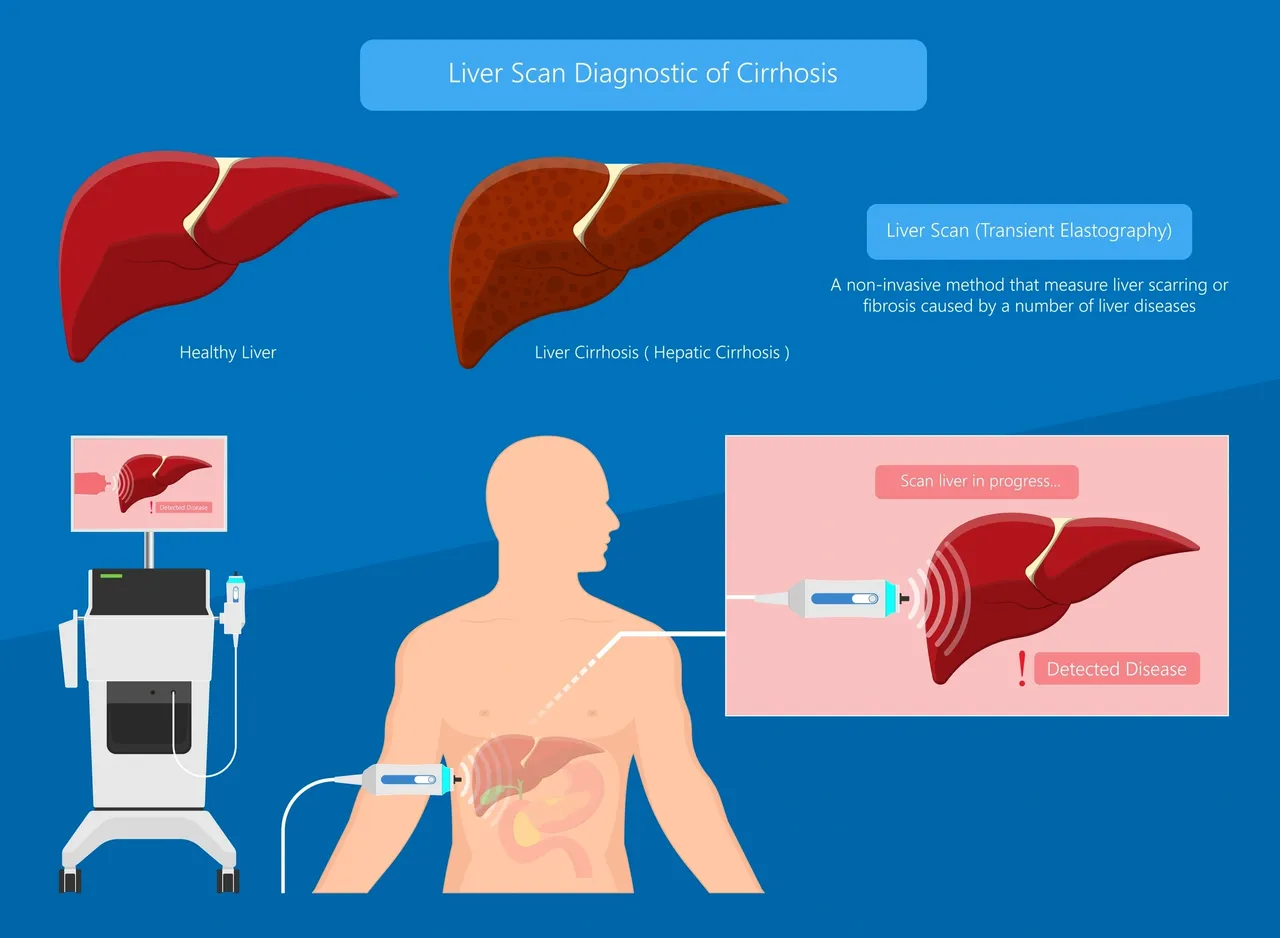
effect on body part
- Detects liver fibrosis and steatosis non-invasively
- Assesses liver stiffness and fat content
- Monitors disease progression and response to treatment
- Guides treatment decisions
What is Fibroscan?
FibroScan, also known as transient elastography, is a non-invasive diagnostic tool used to assess liver health and detect liver diseases such as fibrosis and cirrhosis. It is a painless procedure that uses ultrasound technology to measure the stiffness of the liver, which is an indicator of the degree of liver damage. FibroScan is a significant advancement in the field of gastroenterology, as it provides a more accurate and less invasive alternative to liver biopsy, which is the traditional method of diagnosing liver diseases.
The FibroScan device consists of a probe that is placed on the skin over the liver, typically on the right side of the abdomen. The probe emits a low-frequency pulse of ultrasound waves, which penetrate the liver tissue and cause it to vibrate. The speed at which the vibrations travel through the liver is measured, and this information is used to calculate the liver's stiffness. The stiffer the liver, the more likely it is to be damaged by fibrosis or cirrhosis.

effect on body part
- Detects liver fibrosis and steatosis non-invasively
- Assesses liver stiffness and fat content
- Monitors disease progression and response to treatment
- Guides treatment decisions
What is Fibroscan?
FibroScan, also known as transient elastography, is a non-invasive diagnostic tool used to assess liver health and detect liver diseases such as fibrosis and cirrhosis. It is a painless procedure that uses ultrasound technology to measure the stiffness of the liver, which is an indicator of the degree of liver damage. FibroScan is a significant advancement in the field of gastroenterology, as it provides a more accurate and less invasive alternative to liver biopsy, which is the traditional method of diagnosing liver diseases.
The FibroScan device consists of a probe that is placed on the skin over the liver, typically on the right side of the abdomen. The probe emits a low-frequency pulse of ultrasound waves, which penetrate the liver tissue and cause it to vibrate. The speed at which the vibrations travel through the liver is measured, and this information is used to calculate the liver's stiffness. The stiffer the liver, the more likely it is to be damaged by fibrosis or cirrhosis.
Types Of Fibroscan
Pre-treatment Fibroscan
Assessing liver fibrosis before initiating gastro treatment to determine baseline liver health.
Monitoring Fibroscan
Regular Fibroscan evaluations during gastro treatment to track liver stiffness changes and treatment effectiveness.
Post-treatment Fibroscan
Evaluating liver fibrosis levels after completion of gastro treatment to assess treatment outcomes.
Fibroscan-guided treatment
Adjusting gastro treatment strategies based on Fibroscan results to optimize liver health.
Fibroscan for complication prediction
Using Fibroscan to predict and prevent gastro treatment-related liver complications such as portal hypertension.
Fibroscan for long-term management
Incorporating Fibroscan into long-term gastro treatment plans for continuous monitoring and liver health maintenance.
Types Of Fibroscan
Pre-treatment Fibroscan
Assessing liver fibrosis before initiating gastro treatment to determine baseline liver health.
Monitoring Fibroscan
Regular Fibroscan evaluations during gastro treatment to track liver stiffness changes and treatment effectiveness.
Post-treatment Fibroscan
Evaluating liver fibrosis levels after completion of gastro treatment to assess treatment outcomes.
Fibroscan-guided treatment
Adjusting gastro treatment strategies based on Fibroscan results to optimize liver health.
Fibroscan for complication prediction
Using Fibroscan to predict and prevent gastro treatment-related liver complications such as portal hypertension.
Fibroscan for long-term management
Incorporating Fibroscan into long-term gastro treatment plans for continuous monitoring and liver health maintenance.
Your trusted destination for comprehensive care and management of gastroenterology diseases
Your trusted destination for comprehensive care and management of gastroenterology diseases
Treatment Approaches at Gastroworld Clinic
Fibroscan-guided lifestyle interventions
Fibroscan results to optimize diet, exercise, and lifestyle habits for liver health improvement.
Medication Management
Gastroworld Clinic prescribing and monitoring medications to treat liver-related conditions identified through Fibroscan assessments.
Hepatitis Management
Comprehensive care for hepatitis B and C patients, including antiviral therapies and Fibroscan monitoring to assess treatment response.
Fatty liver disease Management
Multidisciplinary approach combining dietary modifications, weight management, and medication therapies guided by Fibroscan evaluations.
Cirrhosis management
Gastroworld Clinic provide personalized treatment plans for cirrhosis patients, incorporating Fibroscan monitoring to assess disease progression and guide interventions.
Fibroscan-guided liver health screenings
Regular screening to detect liver fibrosis early and initiate timely interventions for prevention and management.
Treatment Approaches at Gastroworld Clinic
Fibroscan-guided lifestyle interventions
Fibroscan results to optimize diet, exercise, and lifestyle habits for liver health improvement.
Medication Management
Gastroworld Clinic prescribing and monitoring medications to treat liver-related conditions identified through Fibroscan assessments.
Hepatitis Management
Comprehensive care for hepatitis B and C patients, including antiviral therapies and Fibroscan monitoring to assess treatment response.
Fatty liver disease Management
Multidisciplinary approach combining dietary modifications, weight management, and medication therapies guided by Fibroscan evaluations.
Cirrhosis management
Gastroworld Clinic provide personalized treatment plans for cirrhosis patients, incorporating Fibroscan monitoring to assess disease progression and guide interventions.
Fibroscan-guided liver health screenings
Regular screening to detect liver fibrosis early and initiate timely interventions for prevention and management.
Frequently Asked Questions
What is Fibroscan?
Fibroscan is a non-invasive medical device that uses ultrasound technology to measure liver stiffness. It is used to assess liver fibrosis, a condition characterized by the thickening and scarring of liver tissue.
How does Fibroscan work?
Fibroscan generates low-frequency ultrasound waves that pass through the liver. The stiffness of the liver tissue affects the speed at which the waves travel, and Fibroscan measures this speed to determine liver stiffness.
What are the indications for Fibroscan?
Assessing liver fibrosis in patients with chronic liver diseases such as hepatitis B, hepatitis C, and non-alcoholic fatty liver disease (NAFLD) Monitoring the progression of liver fibrosis over time *Guiding treatment decisions and assessing response to therapy
How is Fibroscan performed?
Fibroscan is a quick and painless procedure. The patient lies down on an examination table with their right arm raised. The technician places the Fibroscan probe on the patient’s abdomen and applies gentle pressure. The probe generates ultrasound waves and measures the liver’s stiffness.
What are the limitations of Fibroscan?
Severe obesity Ascites (fluid accumulation in the abdomen) Severe liver inflammation or necrosis
